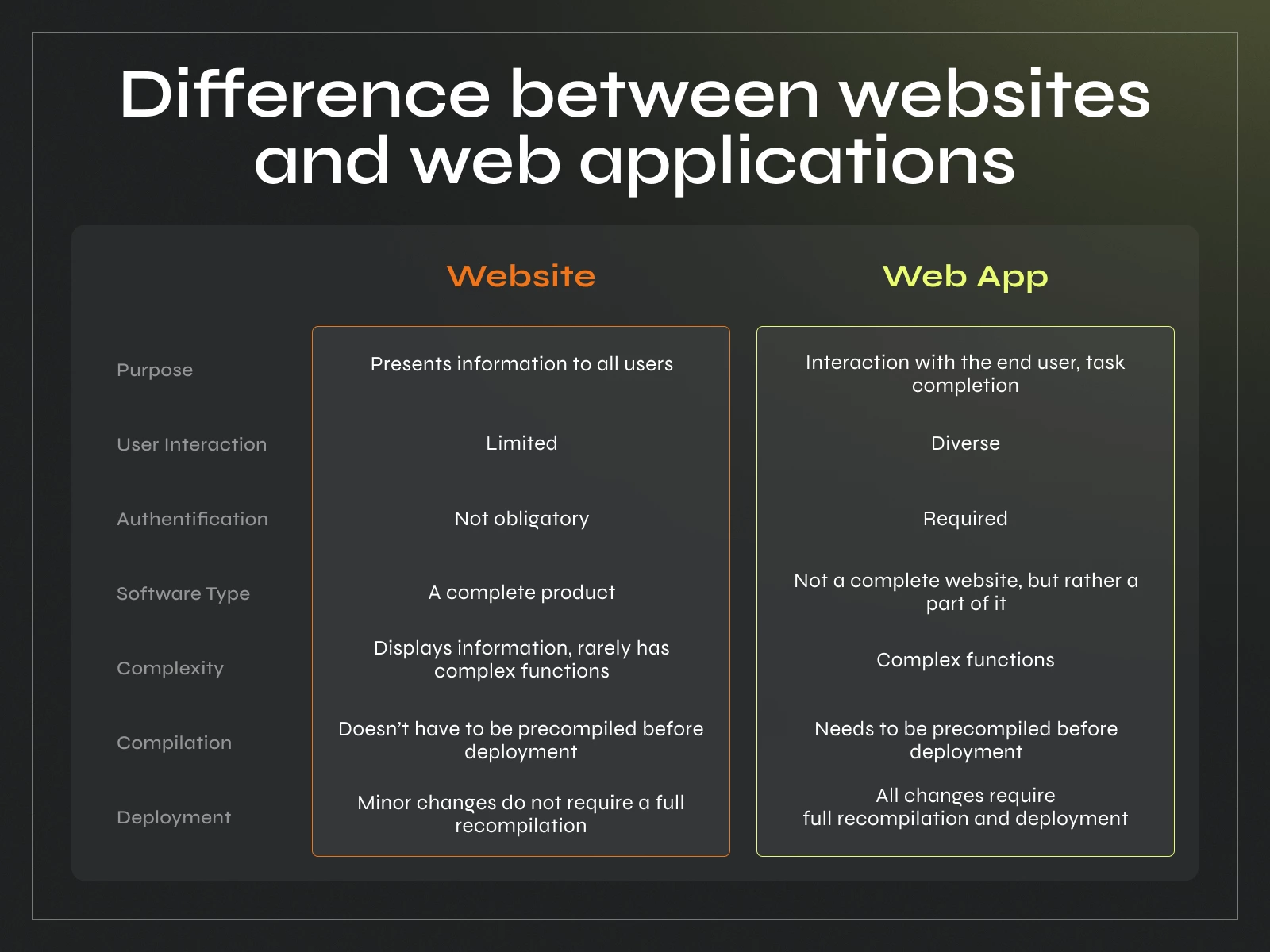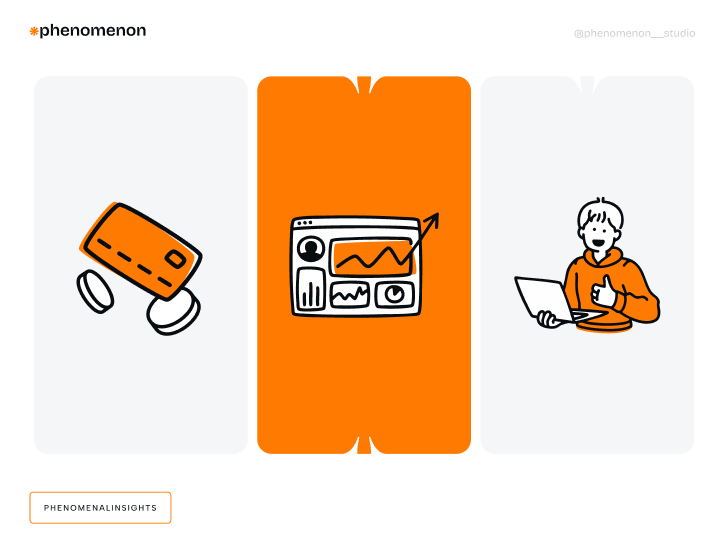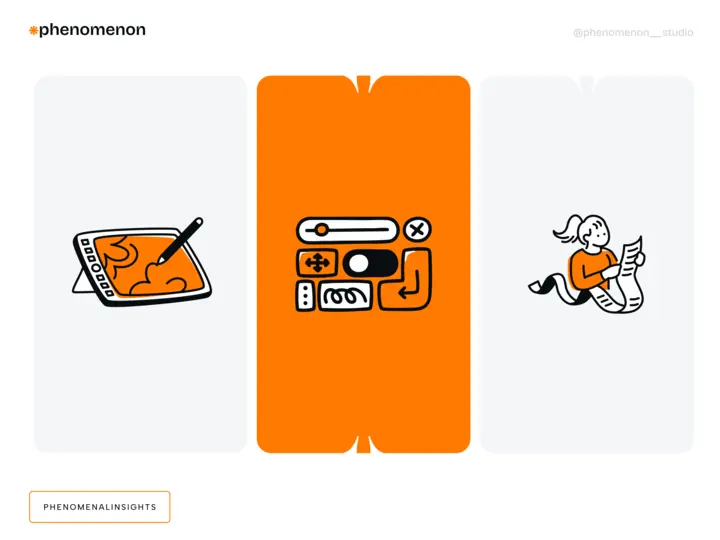Explore the distinctions between web applications and websites in this insightful article. Delve into the unique features, functionality, and use cases of each to make an informed decision on which suits your requirements best.
The average internet user rarely thinks about whether they’re using a website or a web application; frankly, they don’t need to. Their main concerns are for the solution to operate fast and be user-friendly. But who does need to be aware of the different features and intricacies of the two? The demand is businesses waiting to extend their internet presence and streamline their service delivery, and the supply is software development agencies and teams. Interestingly, both web apps and websites go hand-in-hand in terms of popularity — back in December 2021, 54% of users were on apps, and 46% were on websites. So, in case you’re wondering which one you need, especially since data clearly shows users haven’t made up their minds yet, Phenomenon knows the answer.
Continue reading, and we’ll help you make an informed decision based on your needs, drawing on our experience.
Characteristics of Websites
First, let’s begin by defining key terms — specifically, what a website is. People use this word so much, but do they truly know what it means? According to Brittanica, it’s a collection of pages and related resources under one domain name organized around a “home page.” Usually, websites contain loads of videos, audio, text, and other content that years ago used to be static only but have morphed to become dynamic and interactive, thanks to talented development, design, and other teams. Prominent examples of website pioneers are Wikipedia, BBC, the New York Times — all these giants can boast of their “most visited websites in the world” statuses.
Now, let’s define the common characteristics of most websites.

- Information presentation. The primary function of a website is to provide visitors with information.
- Navigation. In most cases, websites have clear and understandable navigation, allowing users to transition from one page to another without delays.
- Content publishing. Many websites are developed for content publishing and consumption, so you can frequently find “Insights,” “Blog Posts,” and “News” pages filled with relevant information.
- SEO optimization. Great websites are typically SEO-optimized. This proactive measure is aimed at boosting organic traffic and increasing visibility.
- Limited interactivity. Websites provide visitors with limited interactivity. Usually, the most you can do is fill in a form.
- Responsive design. Most websites operate well across multiple devices, ensuring great visuals and smooth navigation.
Characteristics of Web Applications
Just like a website, a web application is accessed through a browser. Unlike mobile or desktop apps, you don’t need to download them from an app market; you just enter them via a URL, similar to a traditional website. But here’s where differences begin. Web applications are created to help a target user complete a task. From converting file formats, proofreading texts, and tracking expenses to completing an educational course — there are almost no limits to what a web app can help you do. That being said, here’s what makes a web app different:

- Interactivity. Since web apps are designed to enable users to perform tasks, they need to be highly interactive, allowing users to input data and complete their business. If your app doesn’t help users conduct a meaningful task, it simply won’t be used.
- User authentification. In most cases, users have to sign in to proceed. User authentication is mostly used to provide personalized content.
- Real-time updates. To keep users informed, web apps typically have push notifications and real-time updates about important changes or news.
- Task-specific. Usually, web apps have narrow functionality to ensure users can complete specific tasks effectively.
- Database interaction. To store, retrieve, and update information, web apps often work hand-in-hand with databases, ensuring proper data storage and handling.
- Highly-customizable. Web apps allow users to personalize their profiles for a better overall experience. This includes personalized dashboards, colored schemes, and loads of other things.
- Transaction processing. Unlike websites, E-commerce applications handle transactions securely and effectively.
- Cross-device compatibility. Web applications, just like websites, need to operate well across various devices.
Web App vs Website — Key Differences
Both web applications and websites can become your best friends if you want to promote your business and establish your market presence. But, depending on your goals, company size, and the types of services you provide, the choice can differ.

User Interaction
The core difference between the two lies in the amount of interaction users can have. Websites are focused on presenting information, meaning users rarely have a lot of freedom. On the other hand, web apps provide their end users with an array of interaction options. Let’s consider an example: you love ramen, so you decide to explore where this delicious meal is from different recipes, and the most traditional ingredients you can use to make it more authentic. You decide to explore Wikipedia, a website that presents you with all the information you need. That’s about all you can do in terms of interactions with the website.
But you also can solve this problem in a different way. OpenAI’s GPT-3.5 (ChatGPT) is a web application that helps end users solve any problems (with limitations, of course). By providing input in the form of text, questions, or requests, you’ll receive similar answers, broadening your knowledge about the delicious noodles. The website provided you with static data, while the web app allowed you to interact with it and complete a specific task.
Data Handling
Data handling on websites is often done on the client side. For instance, JavaScript may be used for client-side validation of forms or for enhancing user interface elements. In terms of content manipulation, most websites use CMS that allows them to change or update webpages. In most cases, they require limited to no technical background.
Web applications though, perform a significant amount of data processing on the server side. They heavily interact with databases to store and retrieve information like transaction data, user profiles, and other relevant information.
Plus, since user data needs to be protected at all times, it’s critical to implement robust security measures. These include encryption, secure communication protocols, and various measures to prevent unauthorized access.
Advantages and Disadvantages of Websites
The advantages of websites are far-reaching. Here’s a list of benefits you need to know:
- Global reach.No matter where people are from, if they have an internet connection and a computer or any other device, they’ll be able to learn about your product or service. A website is a perfect solution for those who want to spread awareness about their business, especially since 97% of customers say websites influence their purchases.
- Information dissemination.If you want to share information, news, updates, or educational content, a website is a perfect fit.
- Boosted credibility.Responsive, fast, and beautiful websites are a perfect way to demonstrate your credibility to the world. By the way, 94% of first impressions of a website are related to design.
Related: Navigating the Website Redesign Cost Maze for Optimal Results
- Analytics and insights.A comprehensive understanding of your audience’s behaviors is critical to optimizing your website to meet the needs of the target consumer. Website analytics tools help businesses improve content and make more informed decisions.
On the other hand, websites also have some disadvantages you need to be aware of:
- Development costs. Having a fast, responsive, and appealing website with intuitive navigation is expensive because it takes developers, designers, architects, QAs, and loads of other experts to develop a revenue-generating site. This is where a trusted, full-cycle software development partner will come in handy because it’ll provide you with a high-quality result for your money.
- Technical and security concerns. Be prepared to deal with technical issues like downtime or slow loading time. These things do happen even with the best experts on your team. Plus, you’ll need to pay extra attention to security measures to prevent data breaches and other vulnerabilities.
- Competition. According to Forbes, there were 1.13 billion websites worldwide as of 2023, meaning that the competition is wild. Making your website noticeable will take much of your time and energy.
- Limited interactivity. Compared to web applications, websites can’t help users accomplish many tasks. The most you get is information.
Advantages and Disadvantages of Web Applications
Once again, web applications are perfect solutions for businesses that provide their end customer with a service, and help them complete a task. Here’s a list of benefits:
- No installation is required.Web apps are useful because you can access them directly through a web browser without the need for complex installation or updates.
- Centralized data storage.With a web application, you can access data from multiple devices. All you need is a stable internet connection.
- Collaborative capabilities.Many web apps enable multiple users to work simultaneously, which makes them perfect for teamwork.
- Automatic cross-browser compatibility.These solutions are typically designed to work well across multiple browsers, thus providing a consistent user experience.
However, there are some disadvantages decision-makers need to be aware of.
- Limited access to device features.Web applications sometimes have limited access to device features, which decreases their functionality.
- Limited offline functionality.Once you’re offline, many web apps become almost useless since they predominantly depend on internet connection.
- High chances of lagging during complex tasks.When compared to native programs that run directly on the device, web applications may lag when performing complex tasks or resource-intensive procedures.
Most of these disadvantages can be addressed by an experienced team that knows how to ensure a smooth experience across various devices.
Future Trends: Websites and Web Applications
Low-code and no-code development are growing at an unprecedented speed. According to the latest data, the low code development market is projected to reach USD 148.5 billion by 2030. But what makes these approaches so popular? First, they allow customers to enjoy a freshly-developed website or web application five times faster than utilizing traditional coding methods. Despite a popular misconception, it does not mean there’s no longer a need for IT teams. All it does is help them achieve more in less time and reuse elements to avoid having to start from scratch while coding, thus saving you money. Plus, the team size decreases, making the project even more cost-efficient.
Unlike traditional development, no-code approaches make it way easier to incorporate generative AI to automate processes and help IT teams focus on core processes. Also, AI tools, cloud services, databases, robotic process automation (RPA) bots, and APIs can all be connected in a matter of minutes rather than hours or days with the help of an enterprise-class, low-code automation platform, which offers prebuilt, no-code integration and templates. Utilizing these tools saves you loads of valuable time, making your web app or website ready to establish your online presence without delays.
Motion design UI is picking up steam as well. It makes web solutions more visually appealing and responsive. Very often it helps them understand the outcome of their actions. For example, subtle animations on button clicks or form submissions help users understand that their request is being processed. More than that, it is used to tell people a meaningful story, incorporating brand elements and personality into your website or web app. Given the huge impact this solution provides, we predict this trend will progressively take over more businesses that value their image and user feedback.
Final Words
There’s no single answer to the question: “What’s better: a web app or a website?” Everything depends on your goals and needs and how you want to interact with your end customer. Both options are great for businesses, both have pros and cons, and both will be perfect if you want to make a statement about your company. How to decide?
Contact Phenomenon Studio, an expert in both web application and website development. Our expertise helps us make informed decisions and choose the right solution for your business.













